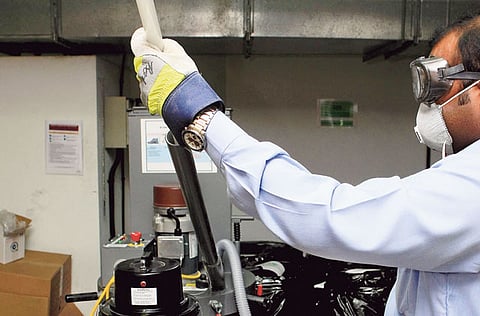Safe disposal of lightbulbs necessary
It is vital to collect mercury in them which otherwise can get into water and accumulate in fish

Dubai: Despite their low-mercury content, lightbulbs are household necessities that need to be disposed of safely, yet up until recently the machinery to do so did not exist in the UAE.
EnPark, the energy and environment park, a member of Tecom Investments has partnered with Idama, a facilities management company, to dispose of lightbulbs within the freezone.
Since June 2010 more than 35,000 lightbulbs have been crushed and their mercury content collected, rather than emitted into the atmosphere.
However, a lack of government guidelines on further and permanent disposal of mercury and lightbulb by-products such as glass, plastic and aluminium, has resulted in the stockpiling of broken lightbulb glass, mercury and materials in Knowledge Village, in Tecom.
Typically a fluorescent bulb, including compact fluorescent light bulbs (CFLs), known as energy-efficient bulbs, and high intensity discharge (HID) bulbs used for streetlights, floodlights or car parks contain between 3.5 to 15 milligrams of mercury.
The Dh25,000 compact machine called a Pre-Lamp Crusher can crush and store the mercury of three million bulbs before the containers have to be emptied.
Located in the car park basement of block 8 in Knowledge Village, the crusher occupies a space between parked car, fenced off and set aside to store bulbs that have yet to be recorded and crushed.
Half a dozen sealed containers also stand in the back, each full with 1,300 crushed bulbs, with nowhere else to go. "We are waiting for guidelines from Dubai Municipality on how to treat this waste further," said Ahmad Lootah, Business Development Manager, Enpark, a freezone for clean energy and environmental technology companies.
Contamination
"We want to showcase sustainable waste management and minimise potentially dangerous content in lightbulbs such as mercury vapour from being released into the environment," he said.
Mercury released into the air is the primary way that it gets into water and accumulates in fish, which can expose humans — who eat contaminated fish — to mercury.
According to the US Environment Protection Agency, most mercury vapour inside fluorescent light bulbs becomes bound to the inside of the bulb's glass as it is used. The remaining mercury within a CFL, about 11 per cent, is released into the air or water when it reaches landfill and in all likelihood, gets crushed.
No options for bulbs
No collection drive exists to dispose of lightbulbs appropriately, said Abdul Majeed Safaee, director of waste management department at Dubai Municipality.
"People at home will place bulbs in their household waste and unfortunately, they go to landfill," he said. "We encourage such initiatives [to collect or recycle] and many companies have such projects or an interest in developing them but nothing for lightbulbs has been fully developed," he said.
According to the US Environment Protection Agency if all 272 million CFLs3 sold in 2009 were sent to a landfill they would add 0.12 metric tons, or 0.12 percent, to U.S. mercury emissions caused by humans.
Dispose your bulbs
To avoid landfilling Idama will collect fluorescent tubes, compact fluorescent light and energy saving light bulbs for crushing, except LEDs and Halogens which are not compatible with the disposal unit, free of charge.
Bulbs can be dropped off on Sundays between 2-4pm at Knowledge Village block 8 basement area. Light bulbs should be segregated by type and handled carefully to avoid breakage.
Javed Khan, Senior Account Manager, Idama oversees the processing of the bulbs by the Pre-Lamp Crusher which is supplied by Ecovar, an Enpark company.
The machine has two parts: one for mercury and one for metal and glass combined. The canister collecting mercury vapour is expected to fill to full capacity in two to three years, or once more than one million tube lights have been crushed, said Khan.
“The drum once full will be sent to a recycling company and will be segregated or separated there for specific recycling. As of now we don’t have segregation of glass and metal directly at our premises and are awaiting the Dubai Municipality approval for the procedure for recycling or else safe disposal to the specific landfill allocated for hazardous waste disposal,” said Khan.



